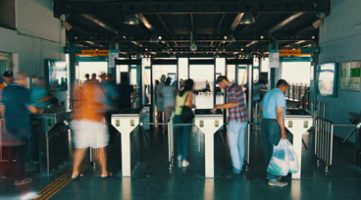
Lebanon
Highlights
- The macroeconomic environment deteriorated in 2019. As a result, credit ratings have been cut and credit default swaps spreads have reached record levels.
- Energy reforms are advancing. A new electricity sector reform plan has been approved by the parliament and reforms of the electricity, oil and gas sectors are under way, strengthened by public-private partnerships (PPPs).
- Political instability and social uprisings undermined the timely implementation of crucial reforms. The formation of a national unity government at the beginning of 2019 initially had provided an enabling governance framework to effectively attract investments and boost economic and structural reforms, which was diluted following the resignation of the government in October.
Key priorities for 2020
- The authorities should boost the diversification of the financial sector. Further efforts should be made to expand the non-bank financial sector, including microfinance, equity finance, leasing and insurance activities.
- More labour market opportunities are needed for excluded groups. Creating employment opportunities could be supported by the improvement of technical and vocational education and training (TVET), and the provision of equitable access to economic opportunities for women and young people.
- A scaled-up National Poverty Targeting Programme should accompany fiscal tightening and reforms. The government should widen the current social safety net and broaden coverage of healthcare programmes to the poor and most vulnerable segments of society, in order to protect them from the short-term impacts of austerity measures.
Main macroeconomic indicators %
| 2015 | 2016 | 2017 | 2018 | 2019 proj. | |
|---|---|---|---|---|---|
| GDP growth | 0.4 | 1.6 | 0.6 | 0.2 | 0.2 |
| Inflation (average) | -3.7 | -0.8 | 4.5 | 6.1 | 3.1 |
| Government balance/GDP | -7.5 | -8.9 | -8.6 | -11.0 | -9.8 |
| Current account balance/GDP | -19.3 | -23.1 | -25.9 | -25.6 | -26.4 |
| Net FDI/GDP [neg. sign = inflows] | -3.0 | -3.1 | -2.3 | -2.4 | -3.0 |
| External debt/GDP | 166.6 | 182.0 | 189.4 | 191.1 | 195.7 |
| Gross reserves/GDP | 73.5 | 78.5 | 76.1 | 64.7 | 54.1 |
| Credit to private sector/GDP | 100.5 | 103.8 | 106.9 | 97.8 | n.a. |
Macroeconomic performance
Economic growth remained sluggish in 2018. Gross domestic product (GDP) grew by a mere 0.2 per cent, mainly driven by private consumption, tourism and exports. The removal of the travel ban to Lebanon in a number of Gulf countries led to an improved performance in the tourism sector, which subsequently benefited private consumption. Furthermore, exports also rose, driven by the opening of land routes with Syria. Inflation moderated to 1.2 per cent year-on-year in August 2019, down from a peak of 7.6 per cent in June 2018, due to an easing in food-price inflation.
The fiscal situation is increasingly challenging. The fiscal deficit widened in 2018 to 11.0 per cent of GDP, as efforts to rein in spending were hindered by political opposition and post-election deadlock from the middle of 2018. Transfers to Electricité du Liban amounted to US$ 1.75 billion, or 3.1 per cent of GDP, mainly because of higher international oil prices. Interest payments also increased, amounting to one-third of total spending, leaving little room for other current or capital spending. The first half of 2019 witnessed an improvement in fiscal conditions, with the budget deficit narrowing by about 20.0 per cent. However, the target of a deficit of 7.0 to 8.0 per cent of GDP in 2019 will be difficult to achieve. Meanwhile, public debt is still the third-highest in the world, at more than 150.0 per cent of GDP as of the end of June 2019.
External imbalances have widened. The current account deficit remained exceptionally high in 2018, at an estimated 25.6 per cent of GDP, the third-highest in the world. This was due to the continued appreciation of the real effective exchange rate (4.4 per cent year-on-year in June 2019) and a large import bill (59.0 per cent of GDP), which was only partially compensated by exports of services (27.9 per cent of GDP) – mainly tourism and financial services. Tourist numbers increased by 7.6 per cent in the first eight months of 2019, mainly due to an increase in tourist arrivals from Gulf Cooperation Council countries, signalling the best tourism season since 2010. Non-resident deposits grew by 0.7 per cent in July, and the net foreign assets of the banking sector (excluding Banque du Liban and gold) declined by 8.7 per cent. Foreign exchange reserves stood at US$ 31.1 billion at the end of July 2019, a US$ 2.6 billion decline since the beginning of the year.
Growth is expected to remain subdued. Growth is expected to remain stagnant in 2019, before falling into negative territory in 2020. However, the outlook remains uncertain, with significant downward risks, given the political instability and social uprisings in the fourth quarter of 2019, which are undermining the timely implementation of crucial fiscal, energy and structural reforms.
Major structural reform developments
The government has approved a new electricity-sector reform plan. Demands on the electricity network have risen markedly since 2012 because of the arrival of more than one million Syrian refugees, which put huge pressure on the electricity national grid. The 10-year plan, approved in April 2019, targets improved electricity generation, transmission and distribution, as well as the elimination of the deficit of Electricité du Liban by 2020. The intention is to reduce the current daily and prolonged blackouts by bridging the supply shortfall. The plan sets out a target of building six new gas-fired power plants over the next six years to cover demand and reduce dependence on temporary capacity, in addition to diversifying the sources of renewable energy. Meanwhile, a set of regulatory and electricity tariff reforms will be considered to attract private investments in energy infrastructure, which will help in addressing infrastructure gaps. Furthermore, the parliament approved a law in April 2019 allowing the government to grant licences for electricity production to private companies.
Plans for increasing renewable energy are advancing, alongside further oil and gas exploration. The government has a target of achieving 12.0 per cent of the energy mix from renewable energy by 2020 and 15.0 per cent by 2030. The government is working on increasing the share of wind and solar energy, alongside hydropower, through PPPs and technology transfers. The government has also launched several solar photovoltaic and wind farm projects under power purchasing agreements, in addition to improving electricity generation from renewable sources to secure a stable and adequate supply for the national grid. Meanwhile, the second licensing round for offshore oil and gas exploration and production was launched in April 2019, and a law for the creation of a sovereign fund for the oil and gas sector is currently awaiting approval.
The Capital Markets Authority has launched an Electronic Trading Platform (ETP). The platform, launched in June 2019, will start its operations within a year. It aims to provide the necessary equity and liquidity for small and medium-sized enterprises and facilitate access to the Lebanese financial markets. In that context, the ETP will contribute to boosting investments in the Lebanese knowledge economy. In addition, it will cooperate with other exchanges around the world, and will attempt to attract investments from the Lebanese diaspora, enabling them to trade and invest in Lebanon electronically.
The Code of Commerce has been amended. The new amendments were approved in March 2019 and entered into force in July 2019. They are intended to modernise the legal framework for companies and improve the business environment. The law also aims to ease the conditions for establishing a limited liability company in Lebanon by no longer requiring firms to have three partners in order to register.
A national statistic framework for TVET for 2018-22 has been launched. The framework articulates the key pillars for reforming the TVET system, with the aims of reducing the inclusion gap through improved employability of young people and helping businesses grow by ensuring the availability of a skilled workforce. Meanwhile, the role of the private sector in developing the TVET system is particularly important, given the market’s inability to create enough jobs – and the right jobs – to accommodate highly skilled graduates, and given the scarcity of skilled labour due to migration.
The parliament has endorsed an e-transaction law. The law, enacted in January 2019, governs digital documents and contracts for individuals and businesses. It brings the country’s e-transactions regulations in line with international best practices, and governs the legal rights and penal provisions for the misuse of data, privacy and modification. The new law also sets forth legal aspects for e-commerce, monetary guarantees and e-banking, with e-checks and digital checks being introduced under the supervision of the Bank of Lebanon.
A new Anti-Corruption Law has been adopted. The law was adopted in June 2019 and is part of the anti-corruption national strategy initiated in 2018, as part of the government’s reform agenda prepared and presented at the CEDRE conference. It aims to address the widespread corruption in the public sector, and paves the way for establishing a National Anti-Corruption Commission.



